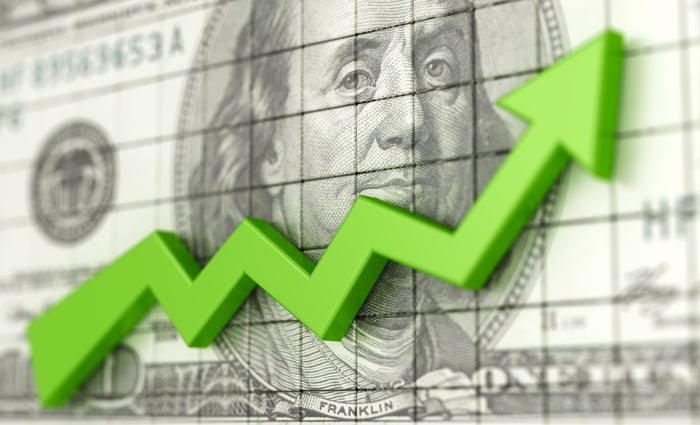During the second quarter, several billionaire-led hedge funds bought positions in the iShares Bitcoin Trust (IBIT -1.57%), an exchange-traded fund (ETF) that tracks the spot price of Bitcoin (BTC 0.59%). The fund is issued by BlackRock, the largest asset manager in the world.
- Israel Englander of Millennium Management added 3.8 million shares. The iShares Bitcoin Trust now ranks among his top 15 holdings.
- Philippe Laffont of Coatue Management bought 56,500 shares. The iShares Bitcoin Trust is one of his smallest holdings, but it represents a new position.
- Steven Schonfeld of Schonfeld Strategic Advisors bought 247,500 shares. The iShares Bitcoin Trust is now his third-largest holding.
- Tom Steyer of Farallon Capital Management added 1.2 million shares. The iShares Bitcoin Trust now ranks among his top 20 holdings.
The billionaires listed above have solid track records. Englander and Steyer rank among the 10 most profitable hedge fund managers in history. And Englander, Laffont, and Schonfeld beat the S&P 500 by at least 15 percentage points over the last three years.
Beyond that, there is another reason individual investors should consider buying a position in the iShares Bitcoin Trust: Several Wall Street experts expect enormous gains in Bitcoin in the years ahead.

Image source: Getty Images.
Some Wall Street experts forecast monster gains in Bitcoin
Despite falling sharply in October, Bitcoin has still advanced 59% over the past year, which puts it 2 percentage points ahead of gold and 42 percentage points ahead of the S&P 500 as of Oct. 18. Bitcoin currently trades at $107,000, but the Wall Street experts below foresee monster upside in the years ahead.
- David Puell at Ark Invest says Bitcoin will hit $710,000 by 2030, which implies 560% upside from its current price.
- Gautam Chhugani at AllianceBernstein expects Bitcoin to reach $1 million by 2033, implying 835% upside from its current price.
- Tom Lee of Fundstrat Global Advisors says Bitcoin can reach at least $3 million in the long run. That implies 2,700% upside from its current price.
- Michael Saylor, executive chairman at Strategy, says Bitcoin will be a $200 trillion asset by 2045, implying 9,400% upside from its current market value of $2.1 trillion.
Investors should never fixate on target prices, especially the ones that promise enormous gains. It's always important to consider the investment thesis before purchasing any asset.
The investment thesis for Bitcoin
Bitcoin prices are a function of supply and demand. But unlike most assets, Bitcoin supply is limited to 21 million coins, which means demand is the most consequential variable. Detailed below are four reasons Bitcoin demand could increase in the years ahead.
- Bitcoin is an inflation hedge: Economists expect sweeping tariffs imposed by President Donald Trump to drive inflation higher. Bitcoin, often called digital gold, is theoretically a good hedge against the devaluation of fiat currency due to its fixed supply. Indeed, its price doubled over the two-year period that ended in June 2022 as CPI inflation reached its highest level in four decades.
- The regulatory environment is more favorable: President Trump campaigned on the promise to make the U.S. the "crypto capital of the world." He has signed executive orders to that effect, and he nominated cryptocurrency advocate Paul Atkins as Securities and Exchange Commission (SEC) chair. Additionally, the SEC earlier this year rescinded Staff Accounting Bulletin 121, a rule that dissuaded financial institutions from providing crypto custody services to clients.
- Spot Bitcoin ETFs are driving demand: Even the best cryptocurrency exchanges create friction by forcing investors to manage digital assets as a separate portfolio. They also tend to charge exorbitant transaction fees. Spot Bitcoin ETFs have unlocked demand by eliminating those headaches. In fact, the iShares Bitcoin Trust was the most successful ETF launch in history by inflows during its first year, and it ranks among the 20 largest ETFs by assets today.
- More institutions are buying Bitcoin: Institutional investors have adopted spot Bitcoin ETFs faster than any ETF in history, according to Bitwise Chief Investment Officer (CIO) Matt Hougan. I already mentioned four hedge funds with positions in the iShares Bitcoin Trust, but Forms 13F show that the number of large asset managers with positions in the ETF more than doubled in the second quarter, and the amount of money those managers have invested increased fivefold.
Here's the big picture: The Trump administration is far friendlier toward the cryptocurrency industry than previous administrations. And the increasingly favorable regulatory backdrop, coupled with the simplicity of spot Bitcoin ETFs, has encouraged more investors to take a position in Bitcoin. Greater adoption among institutional investors is especially important because they had approximately $130 trillion in assets under management last year. Even a small percentage of that sum could send Bitcoin prices much higher.
Caveat emptor: Bitcoin has historically been a volatile asset
As a caveat, while Bitcoin has historically been a reasonable hedge against inflation, it has never acted like a safe haven investment. Whereas gold prices tend to increase throughout periods of economic uncertainty, Bitcoin prices tend to fall sharply under those conditions.
For instance, Bitcoin has dropped 15% from the record high it hit in early October because trade tensions between the U.S. and China have flared up this month. Meanwhile, gold prices have rocketed through a series of record highs because investors see it as a safe haven.
More broadly, Bitcoin has historically been a very volatile asset. It has fallen at least 20% from its record high three times in the past three years alone, and we may see a fourth incident in the next few days. Regardless, similar volatility is almost guaranteed in the future. So, investors uncomfortable with large and frequent price swings should avoid the cryptocurrency and any spot ETFs that track its price.





